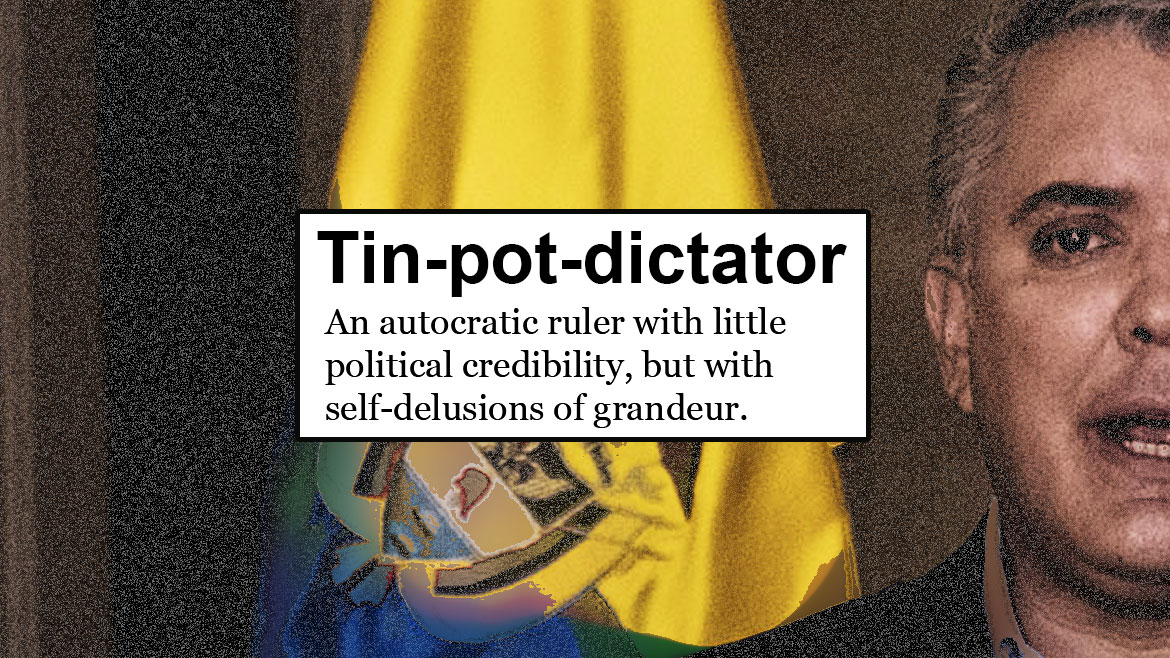
Colombia’s far-right regime put on despot watch list
by Adriaan Alsema July 8, 202
The human rights commission of the Organization of American States (OAS) put Colombia’s increasingly authoritarian President Ivan Duque on its list of suspected despots on Wednesday.
Until Wednesday, the “Special Monitoring Mechanism for Human Rights Issues” of the OAS’ Inter-American Commission on Human Rights (IACHR) only applied to Nicaragua and Venezuela.
The government of Venezuela’s authoritarian President Nicolas Maduro was put on the monitoring list in 2019 after winning elections that were widely considered fraudulent.
Nicaraguan President Daniel Ortega, whose government arrested six presidential candidates this week, has been monitored by the IACHR since 2018 already.
The far-right regime of Colombia’s President Ivan Duque will now also be monitored whether it likes it or not.
Welcome to the list of depots
Colombia’s addition to the special monitoring list all but ends credibility to Duque’s claims his government respects basic democratic and human rights.
The increasingly despotic president had already lost much of his legitimacy after independent media reported early last year that Duque was elected with the help of a drug trafficking organization in 2018.
The IACHR decision means that the OAS body will create a full-time commission to monitor the far-right government’s self-proclaimed commitment to democracy and human rights.
Colombia’s far-right president has long tried to deny his dictatorial tendencies that spurred the IACHR to issue a warning in over Duque’s moves to concentrate power in 2020.
The return of narcoterrorism in Colombia
Oversight whether you like it or not
The special OAS commission will “contribute to the consolidation of peace” in Colombia after government efforts to frustrate an ongoing peace process with demobilized guerrilla group FARC, violent efforts to quell protests and trumped up investigations against opposition politicians.
According to the IACHR, its special monitoring commissions seek to “facilitate an analysis of the decisions and recommendations, allow for public exposure of the case or situation, and provide for a regular and systematic follow-up of the issue, resulting in a more in-depth and focused follow-up” in relation to the government’s respect to human rights.
In the specific case of Colombia, the special monitoring commission will particularly keep an eye on the National Police and the National Army that are facing accusations of widespread human rights abuses.
Like the governments of Nicaragua and Venezuela, Colombia’s regime rejected the decision and has yet to confirm whether it will allow the OAS commission to operate inside the South American country.
The commission monitoring Ortega’s regime wasn’t allowed in the country until early this year while Maduro has refused any cooperation with the special monitoring commission on Venezuela.
The end of a three-year charade
The addition to the IACHR’s list of human rights violators is by far the biggest humiliation for the government of Duque and his informal boss, former Medellin Cartel associate and far-right former President Alvaro Uribe.
The informal superior of Colombia’s president was never put on any special monitoring list while in office between 2002 and 2010 despite being tied to the Medellin Cartel and far-right death squads.
Duque’s allegedly criminal misrule has been such that Uribe’s puppet became Colombia’s first suspected threat to democracy in the country’s history and in less than three years.
“Colombia’s worst president ever” is supposed to leave office in August next year but has pulled all kinds of stunts that have severely weakened the possibility of free and fair elections.
Many of Duque’s political and financial patrons are being investigated for their alleged involvement in organized crime and would face serious legal trouble if the president’s far-right Democratic Center party loses power in next year’s elections.
No comments:
Post a Comment